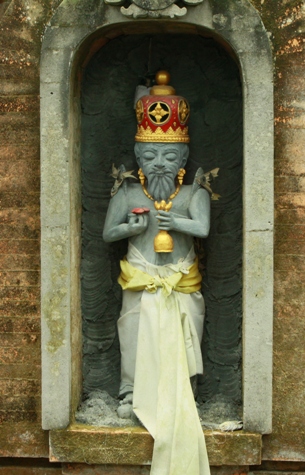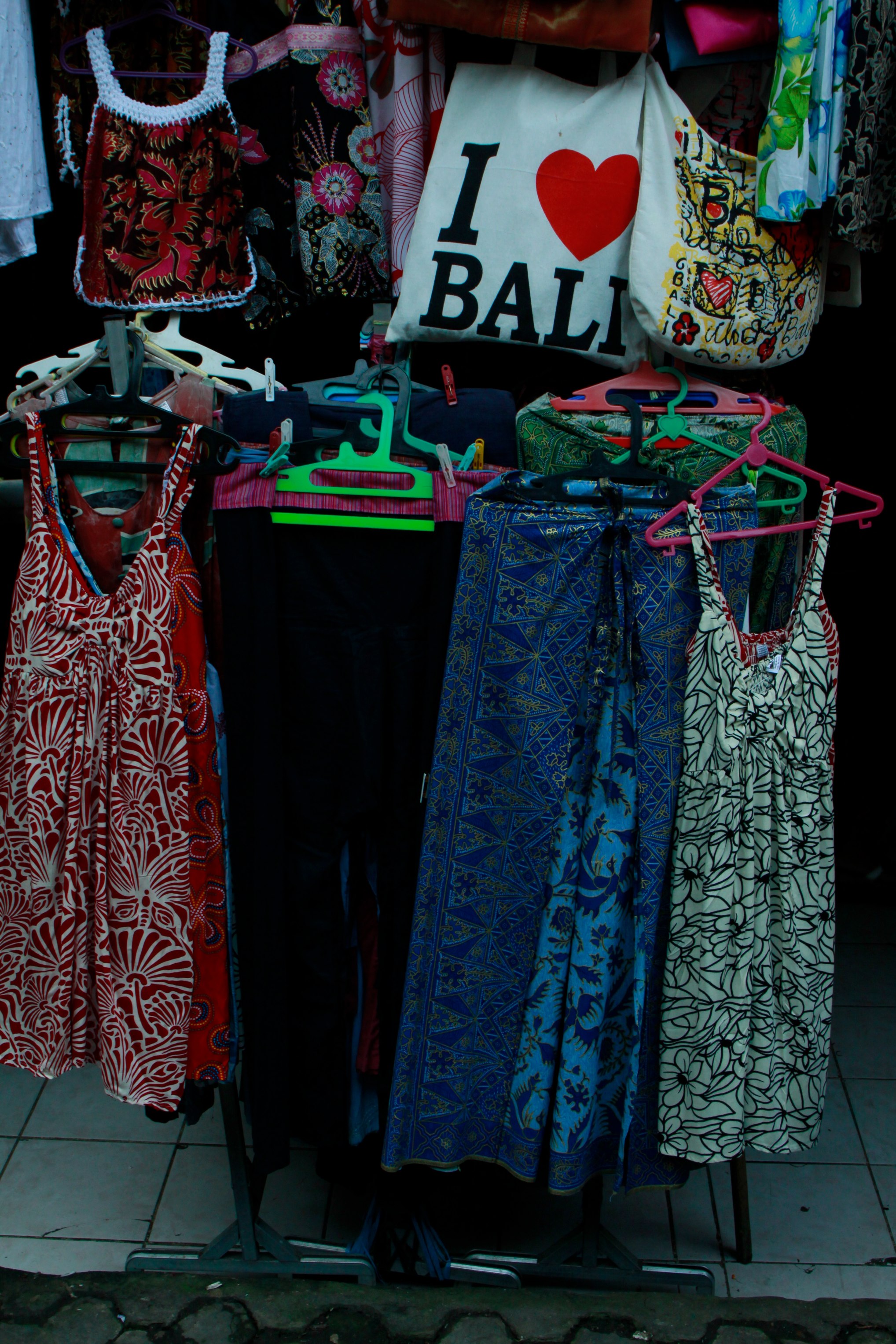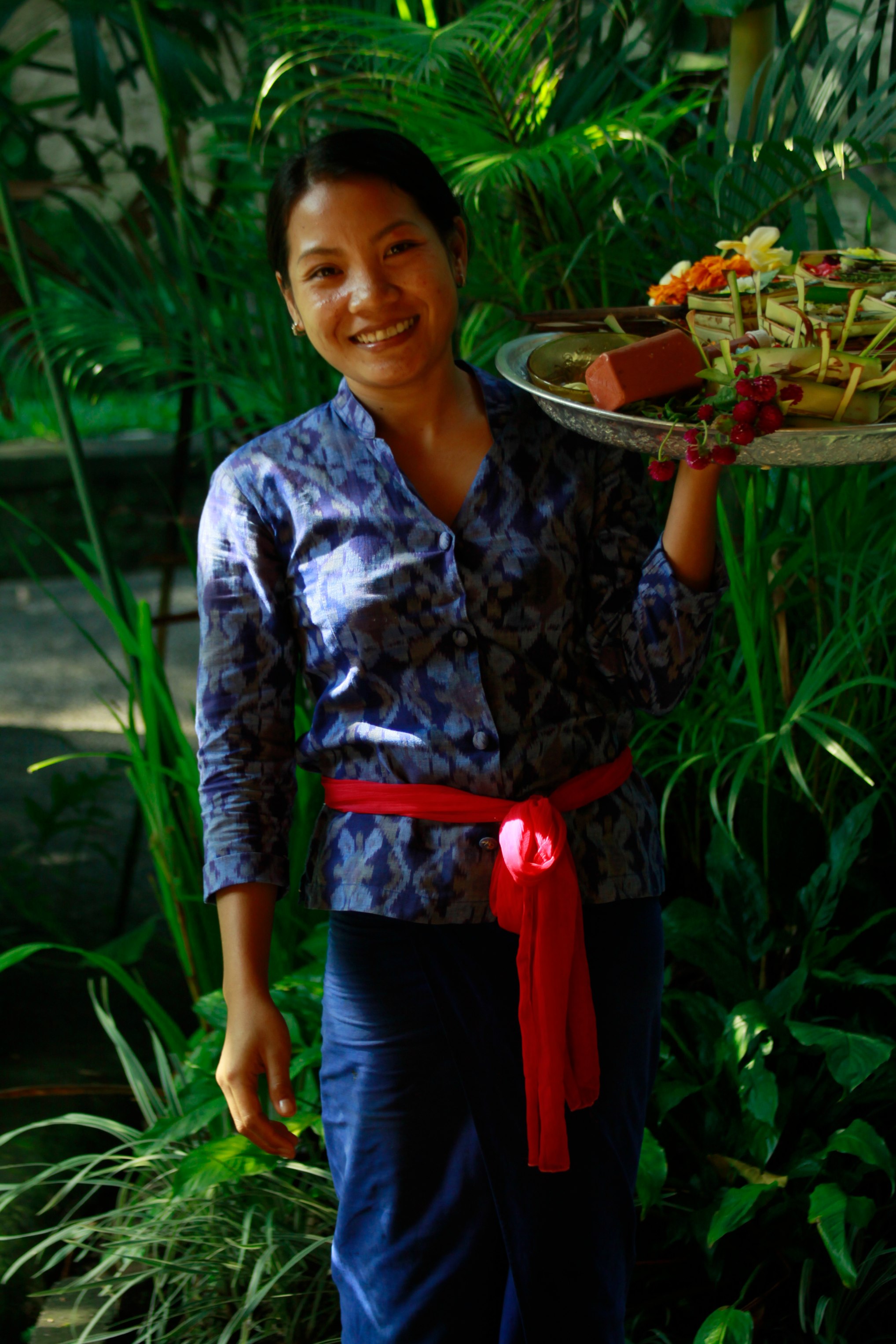Frequently Asked Questions
Q: Where is Bali and what airport will we land/depart?
A: Bali is one of 17,000 islands (6,000 inhabited) that make up the
country of Indonesia. It is 145 km (90 miles) long and 80 km wide
(50 miles). Bali is situated just east of the island of Java and
west of Lombok, in the Indian Ocean.
We will arrive at the Denpasar Airport which is about an hour from Ubud, our first destination.
Q: What can we expect regarding the weather?
A: Daytime temperatures are pleasant, varying between 20-33C (68-93
F) year-round. From December to March, the west monsoon can bring
heavy showers and high humidity, but days are still often sunny with
the rains starting in the late afternoon or evening and passing
quickly. From June to September, the humidity is low and it can be
quite cool in the evenings. At this time of the year there is hardly
any rain in the lowland coastal areas.
Even when it is raining across most of Bali, you can often enjoy
sunny, dry days on the Bukit Peninsula which receives far less rain
than any other part of the island. On the other hand, in central
Bali and in the mountains, you should not be surprised by cloudy
skies and showers at any time of the year.
At higher elevations such as Bedugul or Kintamani, it gets
distinctly chilly and you will need either a sweater or jacket after
the sun sets.
Q:In what time zone is Bali located?
A: Bali is in the UTC+8 time zone (known in Indonesia as WITA, Waktu
Indonesia Tengah), same as Western Australia, Kuala Lumpur,
Singapore, Hong Kong and 1 hr ahead of Jakarta. They are 13 hours
ahead of Texas.
http://www.timeanddate.com/worldclock/city.html?n=761
Q:How long is the flight to Bali?
A: From Houston Bush IA, about 20 hours.
Q: What is the currency of Bali and what is the exchange rate?
A:The currency of Bali is the Indonesian Rupiah (Rp.). Money
changers are always open at Denpasar airport when you arrive in
Bali, but offer exchange rates a little below average.
The Indonesian Rupiah (Rp.) is used for all daily shopping.
The smallest denomination Indonesian Rupiah note is Rp.1,000 and the
largest is Rp.100,000. Be careful with Rp.10,000 vs. 100,000 notes
as they look very similar and can easily be confused. Coins are
almost worthless in Indonesia.
Bali exchange rate information:
The exchange rate in Bali is about US$1 = Rp. 8000-8700, although it
fluctuates daily.
Click here for a converter.
US$ notes that are issued 1996 or earlier, or are in poor condition,
or are issued year 2001 with serial number starting 'CB' may not be
accepted by banks or money changers in Bali. Larger denomination
notes in good condition get the best exchange rate. ATMS are the
exchange location of choice of most travelers.
There are many banks and ATMs which you can use to withdraw
Indonesian rupiah from your home bank account. Most small towns will
have ATMs and a bank too. Some ATMs allow multiple withdrawals
without re-entering PIN number, so take extra care to remove your
credit card from the machine after use
Q: What credit cards/travelers checks are readily accepted in Bali?
A: Master and Visa are accepted in major hotels in Bali. In Bali
there is usually a 3% - 5% bank charge added to credit card
transactions. American Express is less common than other credit
cards and the bank charge is usually higher. Smaller hotels and most
local shops and restaurants only accept rupiah cash.
Travelers checks in Bali:
Most money changers, banks and international hotels will accept
common traveler's checks. Smaller hotels in Bali may prefer cash or
credit card
Q: What is the culturally accepted attire/etiquette for visiting
temples and celebrations?
A:The Balinese are inclusive by nature, take great pride in their
heritage, and therefore do not mind visitors observing ceremonies
and traditional dances, just as long as you follow a few simple,
basic points of etiquette.
Dress appropriately - smart casual is appropriate - swimwear is not
appropriate. Be quiet and respectful. Cameras and camcorders are ok
- but do be unobtrusive. Do not step in front of anyone to snap a
photo. Always sit lower than the local priest presiding over the
ceremony. Do Not touch or pat anyone (including children) on the
head. When visiting temples both men and women should wear long pants
or a sarong with a selendang tied around the waist. You can take
your own, but every major temple has selendangs to borrow for a
small donation. It is extremely bad form, in fact, it is taboo, for
women who are menstruating to enter a temple. If you come up on a
Balinese procession on the way to temple, be patient. It is rude to
try to pass
Q:What language do the Balinese speak? Is English widely
spoken?
A: Bahasa Indonesian is the official language. However, Balinese is
linguistically very different from Bahasa Indonesia, although the
latter is the lingua franca in Indonesia and is spoken by
practically everyone in Bali. In tourist regions, English and some
other foreign languages are widely spoken. Balinese is a difficult
language, and any visitor who makes an effort to speak a few words
will be especially warmly received by the local people.
Our local travel guides speak English.
Click here for the Balinese phrasebook!
Q: What is the electrical infrastructure in Bali?
A: Electricity is supplied at 220V 50Hz. Outlets are the European
standard CEE-7/7 "Schukostecker" or "Schuko" or the compatible, but
non-grounded, CEE-7/16 "Europlug" types.
American and Canadian travelers should pack a voltage-changing
adapter for these outlets if they plan to use North American
electrical equipment (although a lot of electronics with power
adapters will work on 220 volts), check your equipment first.
Q: What are the passport requirements for entering Bali?
A: Travelers from the US/Canada must be in possession of a passport
which is valid for at least 6 months prior to the date of arrival
and the completed embarkation/disembarkation card they received from
their airline. You must also be able to prove you have sufficient
funds for their stay in Indonesia.
NOTE: Check also with your first international entry as it may
differ from Bali.
Q: Do I need a Visa to enter Bali?
A:Yes VISA on ARRIVAL (VoA)
This facility is now available for nationals of the US and Canada.
Citizens of these countries will be able to apply for a VoA valid
for 30 days upon arrival by air in Bali. A 30-day visa costs US$25
and is extendable for another 30 days. Be aware that Immigration
officials calculate the 30-day period as follows: your arrival day
is counted as your first day, and you must leave the country on the
30th. or 60th. day!
Arriving travelers with Visa-On-Arrival status have to go first to
one of the "VoA Counters" to pay the appropriate fee and have their
passports stamped with the VoA before proceeding to the Immigration
Clearance Desk. An official bank is part of the VoA service
counters. Payment of visa fees can be made in US Dollar or Indonesia
Rupiah. Visit the following link for more Visa details:
http://www.kbri-canberra.org.au/consular/visa/visas.htm
Q: Are there prohibited items going into/leaving Bali?
A: Weapons, narcotics and pornography are prohibited to bring into
Bali. Pets are strictly banned to prevent the spread of rabies. You
are only allowed to bring a maximum of one liter of alcohol, 200
cigarettes, 50 cigars or 100grams of tobacco and a reasonable amount
of perfume into Indonesia.
Photographic equipment, typewriters, laptop computers and radios are
admitted, provided that they are taken out on departure. All these
should be declared via a customs declaration form that must be
completed before arrival.
Another subject is the import and export of currencies; one is not
allowed to import or export Indonesian currency exceeding Rp. 5
million.
In addition, the export of national treasures is frowned upon -
genuine antiques, tortoise shell, crocodile skins and ivory are not
to be taken out of Indonesia.
Photos are the property of Roger Zessin. All rights reserved.





